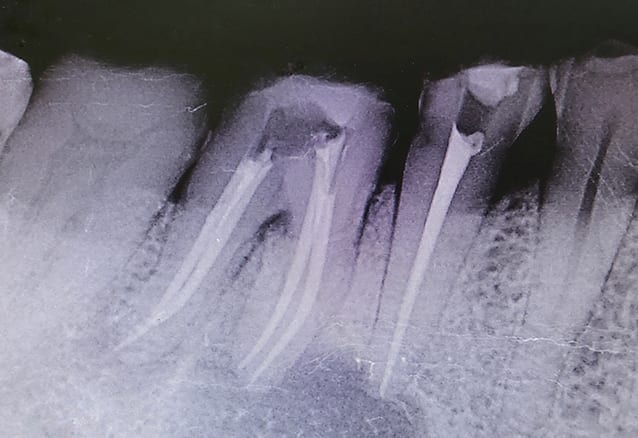Root Canal Retreatment
What is a Root Canal Retreatment?
With proper care, you’ll keep teeth that have had root canal treatment for a lifetime. However it’s possible for those teeth to heal improperly, becoming painful or diseased months or even years after treatment. If this happens to your treated teeth you have a second chance to save the tooth with retreatment. An additional procedure may be able to diminish dental pain or discomfort and promote healing. If you suspect a tooth that had a prior root canal requires retreatment, visit your endodontist for evaluation.

Is a Root Canal Retreatment Right for Me?
- Do you have narrow or curved canals which were not cleaned during the initial root canal procedure?
- Do you have complicated canal anatomy which went undetected during the first procedure?
- Was the placement of the crown or other restoration delayed following the root canal treatment?
- Is your defective crown or restoration failing to prevent salivary contamination to the inside of your tooth?
- Do you have a crack in your tooth?
- Do you have new decay in your tooth that is exposing the root canal filling material to bacteria, causing new infection in the tooth?
- Do you want to save your natural tooth as opposed to extraction or dental implants?
If you answered “yes” to any of these questions, then you should consult an endodontist to discuss if a root canal retreatment is the right solution for you.
Benefits of Root Canal Retreatment and Saving your Natural Tooth?
Natural
Whenever possible, it is best to save your natural tooth. Retreated teeth can function well for years, even for a lifetime.
Virtually Pain-Free Procedure
Root canal treatment is virtually painless and often leaves you with less discomfort during recovery than if you have your natural tooth extracted. Thanks to modern techniques and effective anesthesia, patients who experience root canals are six times more likely to describe it as painless than patients who have a tooth extracted.
Efficient and Cost-Effective
Tooth extraction can take longer than root canal treatment due to follow-up appointments required for a denture, bridge or implant; plus the cost may be higher. Most dental insurance plans cover endodontic treatment.
Visually Appealing Result
Crowns not only function like natural teeth; they look great, too. Improve your smile and laugh out loud again with root canal treatment.

What’s the Next Step?
If you think you are need of a root canal retreatment, then the next step is to schedule a consultation with a root canal specialist. At this visit we will examine and diagnose your tooth/teeth to determine if a root canal is right for you. Your options will be presented and we will work together to save your tooth.
If nonsurgical retreatment is not an option, then endodontic surgery should be considered. Your endodontist will discuss your options and recommend appropriate treatment.
